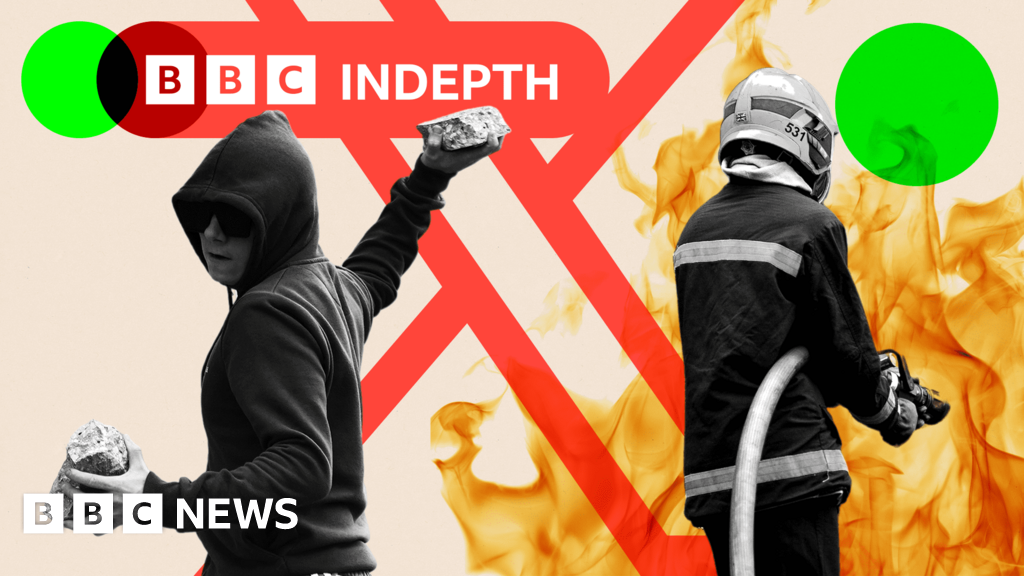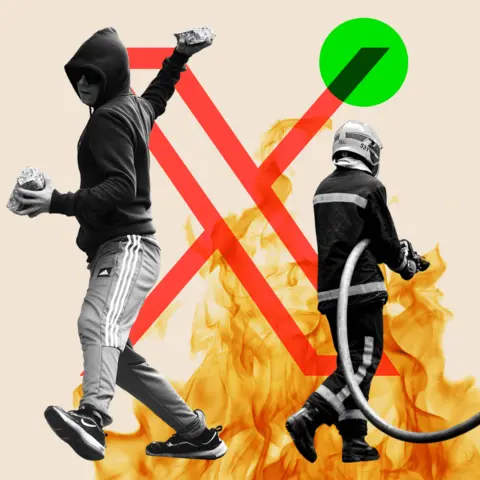UK disorder: What’s Elon Musk’s game?

 BBC
BBCX can feel like two parallel universes at times.
There’s the version where the president of the United States chooses the platform to announce he won’t be running for re-election. That’s the one where the worldwide authority on a particular subject uses X to offer their expert take on unfolding events.
And then there’s the version where false claims, hate and conspiracy theories, including many posts relating to the recent riots and protests across the UK, are recommended to millions who have made absolutely no attempt to seek them out.
At the centre of it all is X’s owner Elon Musk, one of the world’s richest people. But this isn’t just a story about the monetisation strategy and algorithms employed by X under his tenure and how they are boosting divisive content.
It is increasingly also a story about how Mr Musk himself is choosing to wade in, overtly, to opine on unrest in the UK.
And nobody is quite sure what his game plan is.
Stirring the pot
Mr Musk bought what was then called Twitter in 2022. In November 2023, the site reinstated the account of the previously banned far-right activist and convicted criminal, Stephen Yaxley-Lennon, known as Tommy Robinson.
Then this week, Mr Musk responded to a post from Yaxley-Lennon with two exclamation marks – in other words, stirring the pot.
Yaxley-Lennon had taken aim at UK Prime Minister Sir Keir Starmer for his words after riots broke out following the murder of three girls in Southport. Yaxley-Lennon had accused the Prime Minister of labelling everyone upset about the murders as “thugs”. Mr Starmer’s speech had specifically referred to thugs as being those throwing bricks at police officers.
Yaxley-Lennon had also been critical of the prime minister’s comments about increasing policing powers in response to the riots.
Mr Musk then later went on to suggest, in response to a video of rioting, that “civil war is inevitable”. The prime minister’s spokesperson said there was “no justification” for this claim.
Mr Musk doubled down again – responding to the prime minister’s post about attacks on Muslim communities by asking: “Shouldn’t you be concerned about attacks on *all* communities?” And Mr Musk repeated the remark in a tweet of his own, making allegations about violence from anti-racist and Muslim counter-protesters and accusing the police of a “one-sided” approach.
It’s not as if X didn’t already contain plenty of content around events in Southport before Mr Musk’s interventions.
False claims that the person responsible for the killings in Southport was a Muslim refugee who arrived in the UK by boat in 2023 spread like wildfire across X. They then spilled out on to other social media platforms and were also posted on some Telegram channels – but much of the most frenzied, amplified conversation was happening on X.
The claims were shared by pseudo-news accounts, profiles with a track record of promoting evidence-free conspiracy theories about everything from the pandemic and vaccines to wars – and then also by prominent political commentators, politicians and influencers.
The profiles reaching the most users with these ideas had often purchased blue ticks meaning their posts were granted more prominence on the platform.
Mr Musk, with his own blue tick and 193 million followers, has been interacting with some profiles sharing divisive content and, in doing so, amplifying their message.
‘Radicalising himself’
There’s not currently a definitive answer as to what is driving Mr Musk.
His presence as an active player on his own platform is certainly keeping X talked about.
For all the furore around his ownership of X, last month the site said it had 251 million global daily active users in the second quarter of this year, an increase of 1.6% from the same period of the previous year. Of course, this can be attributed to a range of factors – like what’s happening in the world. While these figures represented a drop in growth, X is still a focal point for digital conversations.
For all the warnings that X would cease to exist under Elon Musk, a variety of different users are continuing to post – including many world leaders and prominent political figures of all stripes.
It may also have something to do with Mr Musk’s views on threats of regulation – and in the UK specifically, the Online Safety Act, which was passed under the previous government.
When this comes into full effect in 2025 it will require social media firms to remove illegal content, including where it is “racially or religiously aggravated”. Mr Musk has repeatedly been vocal about his concerns that attempts by governments to regulate social media sites – like his own – risk infringing freedom of speech.
Others wonder if he has simply spent too much time on X. Sander van der Linden, a professor of social psychology at the University of Cambridge, has suggested that Mr Musk may be “radicalising himself on his own platform”.
Of course, the reasons for the protests and riots in the UK clearly extend far beyond social media.
It’s also the case that the Twitter of old, the pre-Musk version, was far from perfect.
There were accusations of bias and suggestions its moderation policies curbed freedom of expression for particular types of accounts. It also had trolls aplenty. But on paper, its policies and approach were different – and, simply from analysing my own feed before and after the takeover, it was different.
Straight after the takeover, Mr Musk stated the importance of fairness to all sides – including in terms of what then-Twitter allowed to be shared on the site. He has made clear that freedom of expression is a central priority at X – and as a private citizen, like any user, he’s entitled to share his opinion about politics or other topics.
It is a recent development on Mr Musk’s part, though, to decide so clearly to back specific political positions and candidates.
Take, for example, the way he endorsed Donald Trump after the assassination attempt, or the content he shares that is critical of Trump’s opponent Kamala Harris. He’s shared some posts that are very hostile to some liberal views.
Now he has decided to voice opinions on some of the most sensitive issues in British life, too.
What has evolved is a complex dynamic. As owner, Elon Musk oversees decisions made by X that have affected what content is permitted and actively recommended to users. At the same time, his account is thought to be the world’s most followed and itself plays a significant role in shaping the tone of some of X’s most promoted and contentious content.
I’ve repeatedly approached the social media company in relation to the rioting in the UK, including multiple interview requests for Mr Musk. I even posted on X asking him. He has not responded to any of my interview requests.
Mr Musk has highlighted his concerns that the media doesn’t hold power to account any more. And yet most of the time, when I want to ask questions of both him and of X – there is no response from the social media company. X continues to share in its publicly available guidelines that its priority is protecting and defending the user’s voice.
So instead, I have to settle with imagining what I’d say to him if he finally did agree to speak.
I think one of the first things I’d ask would be: “What’s your game plan?”
It’s a question only he can answer.
BBC InDepth is the new home on the website and app for the best analysis and expertise from our top journalists. Under a distinctive new brand, we’ll bring you fresh perspectives that challenge assumptions, and deep reporting on the biggest issues to help you make sense of a complex world. And we’ll be showcasing thought-provoking content from across BBC Sounds and iPlayer too. We’re starting small but thinking big, and we want to know what you think – you can send us your feedback by clicking on the button below.
Related
Why investing in women is a vital next step for…
Get Nadine White's Race Report newsletter for a fresh perspective on the week's newsGet our free newsletter from The Independent's Race CorrespondentGet our fre
Business secretary signals major shift on electric car policy to…
In a determined effort to retain Nissan’s manufacturing presence in Britain, Business Secretary Jonathan Reynolds has vowed to implement “substantial c
Joint Statement: Business Secretary and Fujitsu Services Ltd
Business and Trade Secretary Jonathan Reynolds today (Friday 7 March) met chiefs for Fujitsu in Tokyo to begin talks over the cost of redress for victims of th
UK foreign secretary backs multilateral defence funding for Europe
UK foreign secretary David Lammy has said that a new multilateral fund will be needed to secure Europe’s defence as he confirmed that Britain is “open to”













